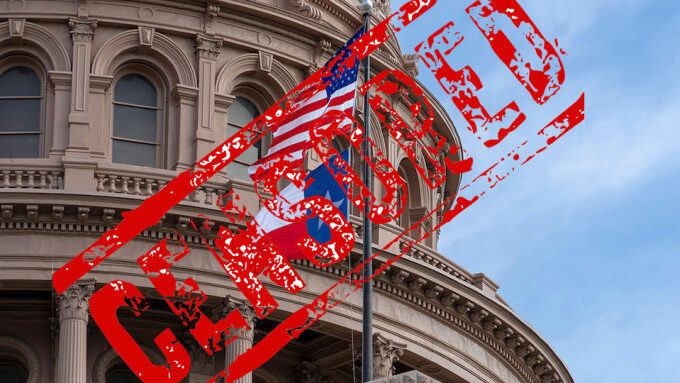AUSTIN, Texas — Several leading free-speech groups, led by the ACLU, urged the U.S. Court of Appeals for the 5th Circuit on Thursday to block the Texas age verification law that requires adult websites to post anti-porn propaganda, contending that this violates the First Amendment.
As XBIZ reported, the Republican-authored HB 1181 was passed by the Texas legislature with bipartisan support in May and was scheduled to go into effect Sept. 1.
On Aug. 31 a federal court in Texas granted a preliminary injunction to the FSC and other plaintiffs, thereby blocking the Texas attorney general from enforcing the controversial law while the case is litigated.
Earlier this month, however, a three-judge panel of the 5th Circuit Court of Appeals issued an administrative stay of the injunction. The two-sentence ruling offered no details or explanations for the decision.
On Thursday, the ACLU submitted an amicus brief arguing the unconstitutionality of HB 1181. The civil liberties group was joined by the Center for Democracy & Technology, the Electronic Frontier Foundation, the Foundation for Individual Rights and Expression, the Media Coalition Foundation and Techfreedom.
A Vague, Unconstitutional Law Compelling Government Speech
According to an analysis by Bloomberg Law, the groups argued that HB 1181 “would burden the right of adults to view lawful sexual content, rob website visitors of their right to anonymity and compel providers of adult content to express the state of Texas’ viewpoint on the allegedly harmful effects of pornography.”
The brief also explained that “requiring visitors to verify their ages before accessing adult content would impose ‘significant burdens’ on the exercise of First Amendment rights online,” Bloomberg Law reported. “The requirement would block some adult visitors from accessing protected content at all, and would rob visitors of anonymity and discourage those who were concerned about privacy and security from engaging with protected speech.”
Arguing that the district court had correctly noted that HB 1181 “was overly broad, lacked clear definitions of key terms and failed to take account of less restrictive means to protect minors, such as parental use of content filters on their children’s devices,” the ACLU-led brief pointed out that the law would also “violate the free speech rights of website operators by requiring them to post disclosures concerning the alleged harms of pornography.”
That requirement, the brief explained, “would force them to voice Texas’ criticism of their own lawful expression ‘under pain of punishment,’” in spite of decades of legal precedent preventing the Abbott administration from infringing on First Amendment rights in that manner, Bloomberg Law reported.








